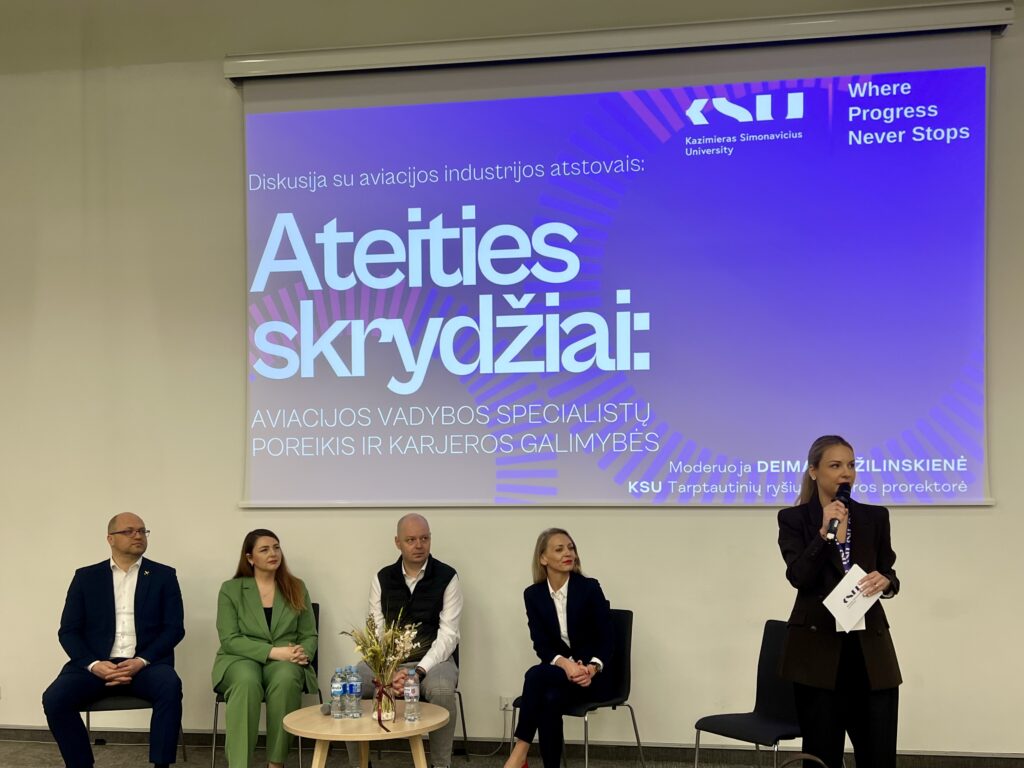As students increasingly seek careers that are not only exciting but globally relevant and future-proof, the aviation industry is taking flight. Once seen as a niche sector, aviation today offers vast career opportunities – both in Lithuania and around the world.
This topic was at the heart of the discussion “Flights of the Future: Demand for Aviation Management Specialists and Career Opportunities,” organised by Kazimieras Simonavičius University (KSU) on 28 March at the “Career & Studies in Lithuania 2025” fair at Litexpo. 
Aviation in Lithuania: Stronger Than It Appears
While Lithuania may not have a national airline, its aviation sector is thriving.
“Lithuanian-owned aviation companies generate around €1.3 billion in GDP annually – over €4 billion globally – and operate in 25 countries,” said Aleksandras Nemunaitis, Chair of the National Aviation Association (LAVIA).
With 6,000–7,000 professionals (excluding flight crew) working across fields like marketing, finance, engineering, HR, legal, and IT, Lithuania is especially strong in aircraft leasing, maintenance, drone technologies, and aviation training. Many local graduates go on to work successfully abroad, thanks to globally aligned education standards.
Precision in the Sky: Lithuanian Excellence in Business Aviation
KlasJet, a Lithuanian capital company, has made a name for itself globally in the VIP and charter flight market.
“Our leased aircraft offer exceptional service tailored to individual needs – from business clients to national delegations,” shared Sandra Diaso, Head of HR at KlasJet.
Aviation Meets Innovation
Though aviation may appear cutting-edge, it remains conservative at its core due to strict safety regulations. This, according to Julius Norkūnas (CEO of Digital Aero Technologies & Aeroclass.org), creates space for bold innovation.
“There are no borders in aviation – the language is English, and the standards are universal, whether you work in Saudi Arabia or Lithuania,” he said.
Norkūnas highlighted Aeroclass, a platform offering online aviation training to professionals from across the globe, proving that aviation careers can be pursued internationally – even without leaving home.
“Forecasts predict that the number of air travellers will double over the next 20 years,” he added. “That means new roles and specialisations are on the horizon.”
A Growing Sector Needs Bright Minds
Inga Duglas, Chair of the Civil Aviation Association (CAVIA), emphasised the growing need for innovation in areas like airport infrastructure, logistics, and hydrogen-powered aircraft.
“The need for skilled professionals will only increase. While aviation is heavily regulated, it thrives on innovation,” she said.
Not Just for Engineers: A Sector for All Talents
Whether your strengths lie in humanities, social sciences, or engineering, there’s a place for you in aviation.
“From commercial roles to aircraft maintenance, the industry needs both technical knowledge and soft skills,” noted Duglas.
“It’s a fast-moving, international, and rewarding sector,” added Sandra Diaso. “Education is important, but personal qualities and adaptability matter just as much.”
Real Careers, Real Students
Deimantė Žilinskienė, KSU Vice-Rector for International Relations and Development, closed the discussion by highlighting real student outcomes.
“We get calls from aviation partners every week, looking for interns or employees – in Lithuania and beyond.”
At KSU, many Aviation Management students are employed before they graduate, proving the sector’s openness to new talent.
“Before choosing your degree, ask yourself if aviation truly excites you. If it does – choose the path where you see your future. This is the perfect field for blending theory with hands-on global experience,” she said.
Share: